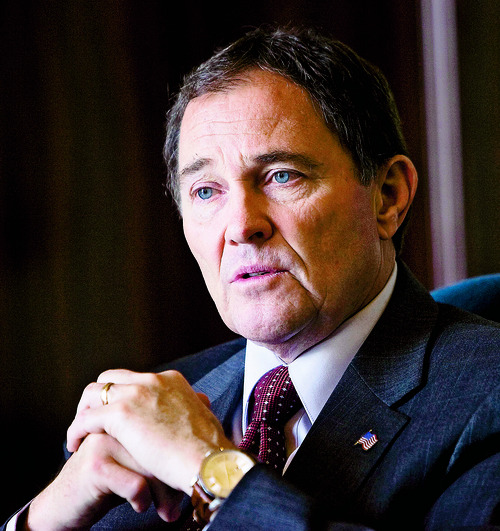This is an archived article that was published on sltrib.com in 2014, and information in the article may be outdated. It is provided only for personal research purposes and may not be reprinted.
Gov. Gary Herbert's controversial comments — calling other states' decision not to defend their same-sex marriage bans the "next step toward anarchy" and implying that homosexuality is a choice — may not impact Utah's legal fight to defend its own gay-marriage ban.
But it has prompted at least one LGBT advocacy group to demand that the governor apologize.
"To suggest that allowing gay marriage is the foundation of anarchy, to us, is hate speech," said John Netto, who heads the Utah Pride Center board. "We think he is uneducated ... on current scientific positions in regard to human sexuality."
Herbert's office did not respond Friday evening to calls for comment.
In his monthly news conference Thursday, the governor said elected officials in states whose same-sex marriage bans were recently overturned, like Pennsylvania and Oregon, shouldn't "pick and choose" what laws they defend.
To do so, he said, is a "tragedy" and the "next step toward anarchy."
Asked about the oft-used comparison between banning same-sex marriage and once-illegal interracial marriage, Herbert said: "What you choose to do with your sexual orientation is different than what you're born with as your race."
Herbert later backed off, saying there may be "different gradations" in sexuality.
The governor's comments spread rapidly through social media, prompting outrage and ridicule from same-sex marriage advocates and lesbian, gay, bisexual and transgender (LGBT) people and organizations.
Several accused Herbert of prejudice, but experts said his remarks likely won't be taken into account in the pending Kitchen v. Herbert lawsuit, which prompted a federal judge in December to overturn Utah's voter-approved ban on gay and lesbian unions.
In the lawsuit, which was heard by the 10th U.S. Circuit Court of Appeals last month, the plaintiffs have argued that the state acted with animus, or ill will, in passing the embattled marriage ban.
University of Utah law professor Cliff Rosky said since the Kitchen case has been decided and appealed, no new evidence can be presented by either side in Utah's effort to keep the state's gay marriage ban on the books.
Even if it were possible to introduce new evidence, Rosky went on, it's unlikely Herbert's comments could be used to prove the kind of bad intent the plaintiffs would need to show animus.
"The governor is not the one who passed Amendment 3, the voters of Utah did," said Rosky, who also sits on the board of Equality Utah. "To prove animus in a trial, would you have to question all Utah voters on the stand?"
U.S. District Judge Robert J. Shelby overturned Utah's same-sex marriage ban Dec. 20, leading more than 1,000 gay couples to wed. The state challenged his ruling, and the case is now before the 10th Circuit.
There is no clear timeline on when the Denver-based court may rule, but experts have said it will likely come sometime in the next two months.
To Netto, the governor's comments show a "lack of understanding" about how Utah's laws affect same-sex couples and their families.
"We are quite confident that the 18 or 19 states that have legal marriage are not in a state of anarchy, and there has been no damage down to heterosexual marriage," Netto said. "We absolutely think he should apologize, and we think he should reach out and we think he should get some education."
Although Herbert's remarks may not amount to much in the fight against Utah's same-sex marriage ban, Rosky noted, if future lawsuits were to be filed against the state alleging discrimination or second-class treatment of LGBT individuals and families based on animus, this is exactly the kind of evidence lawyers would bring before a judge.
"I doubt this is the last lawsuit on the subject of gay rights in Utah," Rosky said.
Twitter: @lwhitehurst, @marissa_jae



